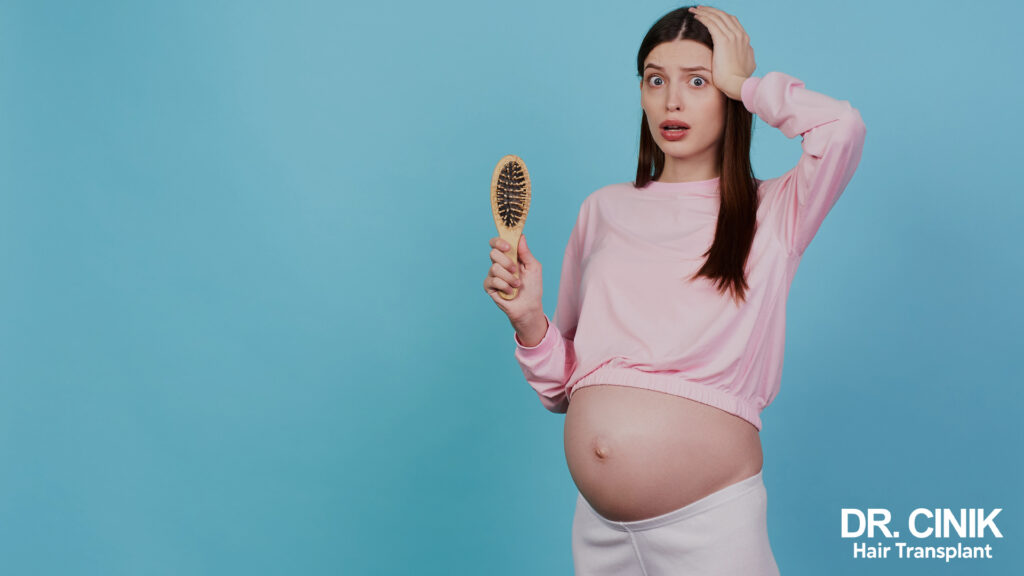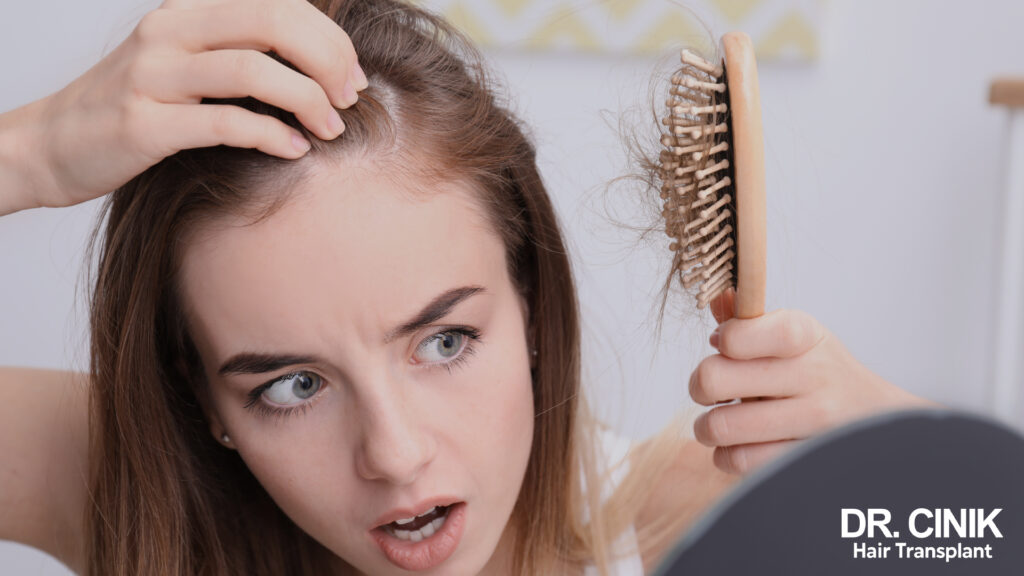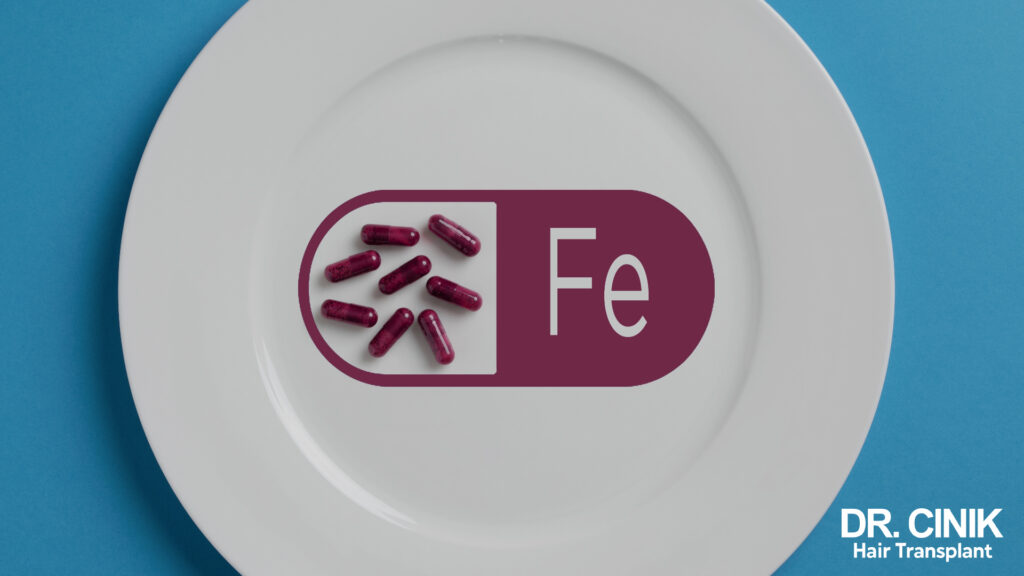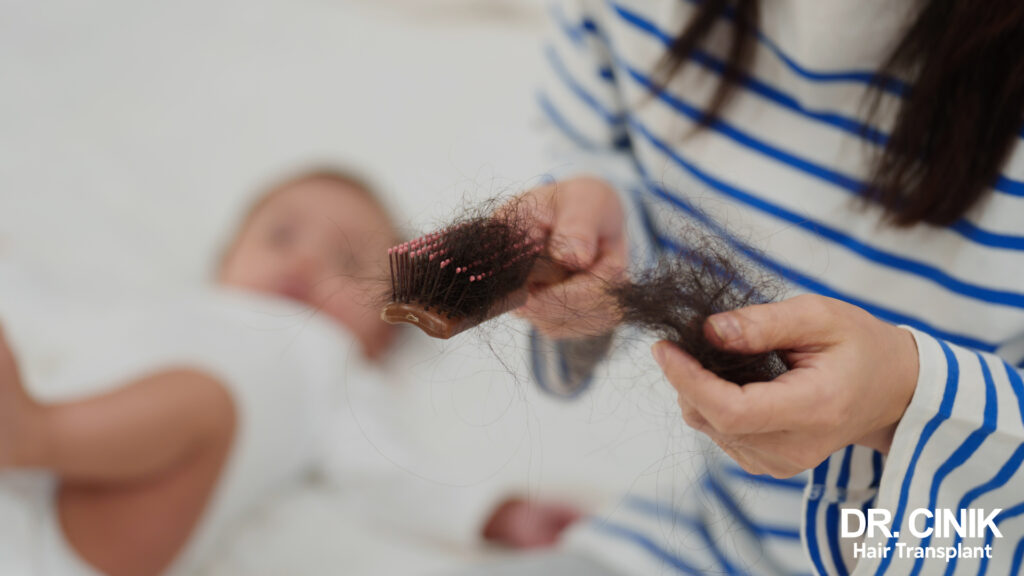Hair loss and pregnancy: what to do?

Summary
Pregnancy is a period of profound transformation for the female body. While some women notice an improvement in the quality of their hair, others face increased hair loss. These variations are normal and often temporary, but they can be a source of concern. Why do we lose our hair during and after pregnancy? What are the solutions to limit this loss and regain a healthy head of hair? Discover the solutions to preserve your hair health during this unique period.
Is it normal to lose hair during pregnancy?
First of all, note that hair loss during pregnancy is a natural phenomenon. This hair shedding can be attributed to several factors, mainly hormonal.
During pregnancy, the body produces an increased amount of oestrogen. These hormones directly influence the hair cycle. In some women, they prolong the anagen phase (growth phase), giving the illusion of a thicker and healthier head of hair (Gizlenti & Ekmekci, 2014). However, in others, this hormonal upheaval causes premature hair loss. Thus, the reaction of the hair follicles to these hormonal fluctuations varies from woman to woman.

Stress
Pregnancy is a demanding period, both physically and emotionally. Accumulated stress can disrupt the hair cycle and cause temporary hair loss called telogen effluvium.
Telogen effluvium is a reaction of the scalp to a shock or significant stress. It corresponds to an acceleration of the transition of hair into the telogen phase, the final stage of the hair cycle, during which hair stops growing and falls out. In this case, an unusual amount of hair falls out at the same time. It is important not to confuse this shedding with alopecia areata, which causes hair loss in patches and follows different mechanisms.

Nutritional deficiencies
During pregnancy, nutritional needs increase considerably to ensure the proper development of the foetus. Consequently, if the expectant mother’s diet is unbalanced, certain deficiencies may appear and weaken the hair.
Deficiencies in iron, zinc and B vitamins are often the cause of increased hair loss. Iron is crucial for the oxygenation of hair follicles, while zinc and B vitamins are involved in the production of keratin, the main protein in hair. It is therefore essential to adopt a rich and varied diet to prevent these deficiencies.

Stopping contraceptive pill
Stopping hormonal contraception can also contribute to hair loss during pregnancy. This phenomenon is particularly pronounced in women who were taking a pill with a high oestrogen content, especially those prescribed for acne treatment.
The contraceptive pill artificially maintains a certain hormonal balance that can promote hair growth. Its discontinuation leads to a modification of this balance, which can cause temporary shedding. Fortunately, this effect is generally compensated for in the second and third trimesters of pregnancy, when the anagen phase (hair growth phase) naturally lengthens under the influence of pregnancy hormones.

What are the hair changes at the beginning of pregnancy?
Hair changes during pregnancy vary considerably from woman to woman. Many expectant mothers notice a significant improvement in the quality of their hair from the first months of pregnancy. They often observe a thicker, stronger and particularly shiny head of hair.
This transformation is explained by the action of pregnancy hormones that prolong the anagen phase (growth phase) of the hair cycle (Gizlenti & Ekmekci, 2014). As a result, hair falls out less and the hair appears denser. The very texture of the hair can change: some women with normally straight hair notice the appearance of curls or waves.

However, these beneficial effects are not universal. The reaction to hormonal changes varies according to individual sensitivity to hormones. Some women notice no significant change, while others may, on the contrary, observe a deterioration in the condition of their hair from the beginning of pregnancy. Research on primates has even shown that the last trimester of pregnancy can be associated with higher levels of hair loss and lower regrowth rates (Heagerty et al., 2024).
When does hair loss start after pregnancy?
If hair loss can occur during pregnancy, it is even more common in the postpartum period. This postpartum hair loss generally begins about two months after childbirth. It is explained by the sudden drop in hormone levels, particularly oestrogen, following delivery.
Recent studies have specified this timeline, showing that postpartum hair loss begins on average 2.9 months after childbirth, peaks around 5.1 months, and generally ends around 8.1 months postpartum (Hirose et al., 2023).

For women who breastfeed, this shedding may be delayed and less intense. Indeed, breastfeeding maintains a hormonal production that continues to stimulate hair growth, making the transition less abrupt. Research has shown that women breastfeeding at 4 months postpartum have a higher anagen rate and a lower telogen rate than those who do not breastfeed (Gizlenti & Ekmekci, 2014). However, paradoxically, prolonged breastfeeding (more than 6 months) has been associated with an increased risk of developing postpartum hair loss (Hirose et al., 2023). When breastfeeding ends, these women may then experience a phase of hair shedding.
Hair regrowth generally begins to be visible about six months after the start of the shedding. However, the return to a head of hair comparable to that before pregnancy can take longer, usually between 12 and 18 months depending on the woman. This delay varies depending on several individual factors, including stress levels, sleep quality and nutritional balance, all of which can be affected during the postpartum period.
How to avoid hair loss during pregnancy?
Although some factors of hair loss during pregnancy are unavoidable, such as hormonal changes, several preventive measures can be taken to limit this phenomenon.

A balanced diet is essential to maintain hair health during pregnancy. It is recommended to favour a diet rich in proteins, iron, zinc and B vitamins.
Stress management during pregnancy is beneficial not only for general well-being but also for hair health. Meditation, prenatal yoga and deep breathing exercises can help reduce anxiety. Maintaining quality sleep is also essential to reduce stress and promote cell regeneration.

Finally, it is advisable to opt for gentle shampoos and treatments, without sulphates or parabens, which cleanse gently without aggressing the scalp. Avoid intensive brushing and prefer a soft brush or a wide-toothed comb. Also limit the use of heating devices such as hair dryers, straighteners or curling irons.
What to do if hair loss persists?
For a small percentage of women, hair loss during or after pregnancy can reveal a more complex underlying problem. In some cases, this shedding may be a sign of androgenetic alopecia, the most common form of hair loss in women, which pregnancy can sometimes trigger or worsen in genetically predisposed individuals.
In other situations, it may be a case of chronic telogen effluvium, where hair loss persists beyond the normal postpartum recovery period. This phenomenon, although rare, can occur in particular in cases of significant and prolonged stress or undiagnosed thyroid disorders, conditions that can be exacerbated by pregnancy.
In the face of persistent shedding, several therapeutic options can be considered:
- Medicinal treatments may be prescribed, such as 2% Minoxidil, which helps reduce hair loss and stimulate hair growth. Note, however, that this treatment can generally only be started after the breastfeeding period, under medical supervision.

- Platelet-rich plasma (PRP) injections also represent a solution to combat hair loss. This technique involves taking blood from the patient, extracting the plasma enriched with platelets, and then injecting it into the scalp. The growth factors contained in this plasma can stimulate regeneration of the hair follicles and promote growth of new hair.

- For more severe cases where the previous solutions prove insufficient, a hair transplant may be considered. This surgical procedure, performed by specialists like Dr Cinik in Turkey, involves harvesting hair follicles from areas where hair is abundant and implanting them in thinning areas. This definitive solution allows to restore hair density naturally and durably.

Sources
Gizlenti, S., & Ekmekci, T. R. (2014). The changes in the hair cycle during gestation and the post-partum period. Journal of the European Academy of Dermatology and Venereology, 28(7), 878-881. https://doi.org/10.1111/jdv.12188
Heagerty, A., Wales, R. A., & Coleman, K. (2024). Effects of Seasonality and Pregnancy on Hair Loss and Regrowth in Rhesus Macaques. Animals, 14(5), 747. https://doi.org/10.3390/ani14050747
Hirose, A., Terauchi, M., Odai, T., Fudono, A., Tsurane, K., Sekiguchi, M., Iwata, M., Anzai, T., Takahashi, K., & Miyasaka, N. (2023). Investigation of exacerbating factors for postpartum hair loss: a questionnaire-based cross-sectional study. International Journal of Women’s Dermatology, 9(2),




